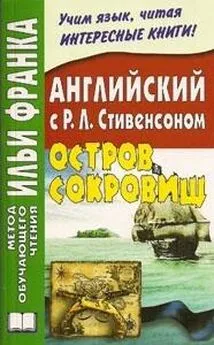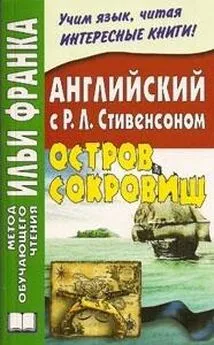Илья Франк - Английский язык с Р.Л. Стивенсоном. Остров сокровищ
- Название:Английский язык с Р.Л. Стивенсоном. Остров сокровищ
- Автор:
- Жанр:
- Издательство:неизвестно
- Год:неизвестен
- ISBN:нет данных
- Рейтинг:
- Избранное:Добавить в избранное
-
Отзывы:
-
Ваша оценка:
Илья Франк - Английский язык с Р.Л. Стивенсоном. Остров сокровищ краткое содержание
Английский язык с Р.Л. Стивенсоном. Остров сокровищ - читать онлайн бесплатно ознакомительный отрывок
Интервал:
Закладка:
вещи»; to hide — прятать, скрывать ),' said another.
thousands [`Tauzqndz] crawling [`krLlIN] sponging [`spAnGIN] coach [kquC]
Мультиязыковой проект Ильи Франка www.franklang.ru
112
1. 'You have your hands on thousands, you fools, and you hang a leg! You'd
be as rich as kings if you could find it, and you know it's here, and you stand
there skulking. There wasn't one of you dared face Bill, and I did it — a blind
man! And I'm to lose my chance for you! I'm to be a poor, crawling beggar,
sponging for rum, when I might be rolling in a coach! If you had the pluck of
a weevil in a biscuit you would catch them still.'
2. 'Hang it, Pew, we've got the doubloons!' grumbled one. 'They might have
hid the blessed thing,' said another.
1. 'Take the Georges, Pew, and don't stand here squalling (бери деньги, Пью, и не
беснуйся: «не стой здесь вопящим»; George — монета в полкроны, гинея; to
squall — вопить, визжать ).'
2. Squalling was the word for it (визжание было словом для этого =
подходящим словом), Pew's anger rose so high at these objections (гнев Пью
вырос так высоко на эти возражения = Пью окончательно разъярился; to rise
— вставать, восходить, подниматься ); till at last, his passion completely
taking the upper hand (пока, наконец, ярость полностью не завладела им;
passion — страсть, гнев, пыл; to take the upper hand — взять верх: «верхнюю
руку» ), he struck at them right and left in his blindness (он наносил им удары
направо и налево в своей слепоте = ослепленный гневом; to strike at —
наносить удар, нападать ), and his stick sounded heavily on more than one (и
его палка ударила тяжело = сильно нескольких /из них/: «более, чем одного»;
to sound — звучать; выстукивать, ударять ).
3. These, in their turn (эти = те, в свою очередь), cursed back at the blind
miscreant (отвечали ругательствами слепому негодяю: «неверующему,
еретику /уст./»), threatened him in horrid terms (угрожали ему в
отвратительных терминах), and tried in vain to catch the stick and wrest it from
Мультиязыковой проект Ильи Франка www.franklang.ru
113
his grasp (и пытались тщетно поймать палку и вырвать ее из его рук; grasp —
хватка, зажим, схватывание ).
squalling [`skwLlIN] blindness [`blaIndnIs] miscreant [`mIskrIqnt] wrest [rest]
1. 'Take the Georges, Pew, and don't stand here squalling.'
2. Squalling was the word for it, Pew's anger rose so high at these objections;
till at last, his passion completely taking the upper hand, he struck at them
right and left in his blindness, and his stick sounded heavily on more than one.
3. These, in their turn, cursed back at the blind miscreant, threatened him in
horrid terms, and tried in vain to catch the stick and wrest it from his grasp.
This quarrel was the saving of us (эта ссора была спасением для нас); for while
it was still raging (пока она все еще бушевала), another sound came from the top
of the hill on the side of the hamlet (другой звук донесся с вершины холма со
стороны деревушки) — the tramp of horses galloping (топот скачущих галопом
лошадей). Almost at the same time a pistol-shot, flash and report (почти в тот же
момент пистолетный выстрел, вспышка и звук выстрела; report — звенящее
эхо /обычно от звука взрыва, выстрела/ ), came from the hedge-side (пришли =
донеслись со стороны изгороди). And that was plainly the last signal of danger
(и это был, очевидно, последний сигнал опасности); for the buccaneers turned
at once and ran (потому что пираты развернулись сразу и побежали),
separating in every direction (разделяясь во всех направлениях), one seaward
along the cove (кто-то /побежал/ в сторону моря, через = по берегу моря), one
slant across the hill (кто-то по склону холма), and so on (и так далее), so that in
half a minute not a sign of them remained but Pew (так что через полминуты ни
следа их не осталось, кроме Пью). Him they had deserted (его они бросили; to
Мультиязыковой проект Ильи Франка www.franklang.ru
114
desert — покидать, бросать ), whether in sheer panic or out of revenge for his ill
words and blows, I know not (либо в полной панике = убегая в паническом
страхе, либо из мести за его дурные слова и удары, я не знаю; ill — больной;
плохой; sheer — абсолютный, полнейший, сущий, явный ); but there he remained
behind (но там он остался /один/), tapping up and down the road in frenzy (стуча
палкой там и сям по дороге в исступлении; frenzy — безумие, бешенство ), and
groping and calling for his comrades (протягивая руки и зовя своих товарищей;
to grope — ощупывать, идти ощупью ). Finally he took the wrong turn (в конце
концов, он повернул не туда: «взял неправильный поворот»), and ran a few
steps past me (и пробежал в нескольких шагах от меня; past — мимо, за, по ту
сторону ), towards the hamlet, crying (по направлению к деревне, крича): —
quarrel [`kwOrql] raging [`reIGIN] deserted [dI`zq:tId] revenge [rI`venG]
This quarrel was the saving of us; for while it was still raging, another sound
came from the top of the hill on the side of the hamlet — the tramp of horses
galloping. Almost at the same time a pistol-shot, flash and report, came from
the hedge-side. And that was plainly the last signal of danger; for the
buccaneers turned at once and ran, separating in every direction, one seaward
along the cove, one slant across the hill, and so on, so that in half a minute not
a sign of them remained but Pew. Him they had deserted, whether in sheer
panic or out of revenge for his ill words and blows, I know not; but there he
remained behind, tapping up and down the road in frenzy, and groping and
calling for his comrades. Finally he took the wrong turn, and ran a few steps
past me, towards the hamlet, crying: —
Мультиязыковой проект Ильи Франка www.franklang.ru
115
1. 'Johnny, Black Dog, Dirk (Джонни, Черный Пес, Дэрк),' and other names (/он
называл/ и другие имена), 'you won't leave old Pew, mates — not old Pew (вы
/же/ не оставите старого Пью, друзья, не оставите; won't = will not )!'
2. Just then the noise of horses topped the rise (сразу после этого шум = топот
лошадей доносился с /вершины/ холма; to top — покрывать, переваливать,
подниматься; rise — возвышенность, холм, восход ), and four or five riders
came in sight in the moonlight (четыре или пять всадников показались в
лунном свете; to come in sight — появиться в поле зрения ), and swept at full
gallop down the slope (и пронеслись во весь опор вниз по склону; to sweep —
сметать, сносить, мчаться ).
3. At this Pew saw his error (тут Пью увидел свою ошибку), turned with a
scream (повернулся с воплем), and ran straight for the ditch (побежал прямо к
канаве), into which he rolled (в которую скатился). But he was on his feet again
in a second (но он был на ногах = поднялся через момент), and made another
dash (выскочил /на дорогу/; dash — порыв, стремительное движение ), now
utterly bewildered (теперь совершенно растерянный), right under the nearest of
the coming horses (прямо под /ноги/ ближайшей из приближающихся
лошадей).
horses [`hLsIz] rider [`raIdq] sight [saIt] error [`erq] bewildered [bI`wIldqd]
1. 'Johnny, Black Dog, Dirk,' and other names, 'you won't leave old Pew,
mates — not old Pew!'
2. Just then the noise of horses topped the rise, and four or five riders came in
sight in the moonlight, and swept at full gallop down the slope.
Мультиязыковой проект Ильи Франка www.franklang.ru
116
3. At this Pew saw his error, turned with a scream, and ran straight for the
ditch, into which he rolled. But he was on his feet again in a second, and made
another dash, now utterly bewildered, right under the nearest of the coming
horses.
1. The rider tried to save him, but in vain (наездник попытался спасти его, но
тщетно). Down went Pew with a cry that rang high into the night (Пью умер с
криком, который разорвал ночь; to go down — упасть, ослабеть, умереть; to
ring — звенеть, раздаваться ); and the four hoofs trampled and spurned him and
passed by (четыре копыта растоптали /его/, отбросили прочь и пронеслись
Читать дальшеИнтервал:
Закладка:


